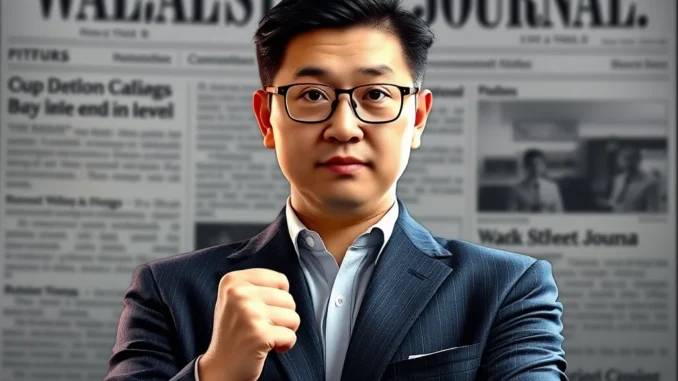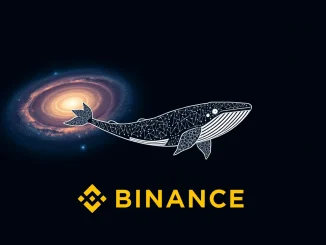
In a dramatic turn of events, Changpeng Zhao (CZ), the former CEO and founder of crypto exchange giant Binance, has vehemently refuted a Wall Street Journal (WSJ) report alleging that he sought a presidential pardon. The crypto community is buzzing with speculation as CZ took to social media platform X to dismiss the claims, labeling the article as not just inaccurate, but also part of a larger orchestrated attack targeting both former U.S. President Donald Trump and the entire cryptocurrency industry. This bold denial has sent ripples through the digital asset space, raising questions about the motives behind the WSJ report and the potential implications for Binance and the broader crypto market.
Why is the CZ Pardon Report Generating Crypto Industry Buzz?
The Wall Street Journal’s report, which has now been publicly contested by Changpeng Zhao himself, claimed that CZ had approached intermediaries to explore the possibility of securing a presidential pardon. This report surfaced amidst ongoing legal scrutiny and regulatory pressures facing Binance and its former CEO. The timing of the report, coupled with CZ’s swift and strong denial, has amplified its significance within the crypto ecosystem. Here’s why this denial is making headlines:
- High Stakes for CZ and Binance: Changpeng Zhao, a prominent figure in the crypto world, stepping down from his CEO role at Binance and facing legal challenges already placed him under intense spotlight. A pardon request, if true, would add another layer to his complex narrative.
- Implications for Crypto Regulation: The news arrives at a crucial juncture where regulatory bodies worldwide are grappling with how to oversee the rapidly evolving cryptocurrency landscape. Allegations and denials involving a figure like CZ directly impact the perception and future regulation of the crypto industry.
- Political Undertones: CZ’s assertion that the WSJ report is an attack on Donald Trump introduces political dimensions to the narrative, suggesting a potentially wider agenda beyond just crypto news. This angle attracts attention from a broader audience, not just those invested in cryptocurrencies.
- Market Sentiment: Any news involving Binance, the world’s largest crypto exchange, can influence market sentiment. Uncertainty and negative press can sometimes trigger market volatility, making CZ’s denial a crucial piece of information for investors and traders.
CZ’s Firm Denial: What Did Changpeng Zhao Actually Say?
Changpeng Zhao did not mince words in his response to the Wall Street Journal report. Taking to X, he stated unequivocally that he “never discussed any Binance.US deal” in the context of a pardon, directly contradicting the core claim of the WSJ article. His denial was not just a simple correction; it was a forceful dismissal, framing the report as a deliberate attempt to damage reputations and sow discord. Key points from CZ’s statement include:
- Categorical Denial: CZ explicitly stated he “never discussed” the purported pardon request, leaving no room for ambiguity. This is a direct and unambiguous refutation of the WSJ’s central claim.
- Accusation of “Attack”: By calling the report an “attack,” CZ escalated the situation beyond a mere factual disagreement. This language suggests a deliberate and malicious intent behind the WSJ’s reporting.
- Defense of Trump and Crypto: CZ broadened the scope of his defense, suggesting the article was not just aimed at him but was part of a wider assault on Donald Trump and the entire cryptocurrency sector. This implies a belief in a coordinated effort to undermine these entities.
- Call for Scrutiny: CZ’s response implicitly encourages skepticism towards the WSJ report and prompts readers to question the motivations and sources behind the article.
Decoding the “Attack” Claim: Is Crypto and Trump Targeted?
Changpeng Zhao’s assertion that the WSJ report is an “attack” warrants closer examination. What could be the basis for such a strong accusation? While concrete evidence of a coordinated attack remains to be seen, several factors could lend credence to CZ’s perspective:
- Regulatory Pressure on Crypto: The cryptocurrency industry has been facing increasing regulatory scrutiny globally. Negative narratives, whether accurate or not, can fuel skepticism and justify stricter regulations. Reports like the one in WSJ, even if disputed, contribute to this negative perception.
- Political Climate: The intersection of crypto and politics is becoming more pronounced. Donald Trump’s stance on cryptocurrencies, and the broader political polarization in the U.S., could make crypto a target in politically charged narratives. Attaching a negative crypto story to Trump could serve political agendas.
- Media Scrutiny of Binance: Binance, as the leading crypto exchange, is often under intense media scrutiny. Any misstep or negative report concerning Binance is likely to be amplified, especially given the scale of its operations and influence in the crypto market.
- Potential Misinformation or Misinterpretation: While CZ alleges an “attack,” it’s also possible that the WSJ report was based on misinterpreted information or unreliable sources. Journalistic errors, while less malicious than a deliberate attack, can still have damaging consequences.
The Broader Implications for Binance and the Crypto Market
Regardless of the veracity of the pardon request report, the ensuing controversy has several significant implications for Binance and the cryptocurrency market as a whole:
| Implication | Description |
|---|---|
| Reputational Impact on Binance | Even a denied report can cast a shadow over Binance’s reputation. Continuous negative press can erode public trust and affect user confidence in the exchange. |
| Increased Regulatory Scrutiny | Controversies like this often attract even closer attention from regulatory bodies. Binance, already under regulatory pressure, might face heightened scrutiny as a result of this public dispute. |
| Market Volatility | While CZ’s denial might mitigate immediate negative market reactions, the underlying uncertainty and the drama itself can contribute to market volatility, especially for Binance-related tokens and the broader crypto market. |
| Fueling the Crypto vs. Traditional Finance Narrative | The clash between a crypto giant like Binance and a traditional financial media outlet like the Wall Street Journal reinforces the existing narrative of conflict and tension between the crypto world and traditional financial institutions. |
Actionable Insights: What Should Crypto Enthusiasts and Investors Do?
In the wake of this CZ-WSJ saga, what steps should crypto enthusiasts and investors consider?
- Stay Informed, Verify Information: Rely on multiple sources for news and analysis. Don’t take any single report at face value, especially in fast-moving situations. Verify information from official sources like CZ’s social media and Binance announcements.
- Exercise Caution in Trading: Be prepared for potential market volatility. News events, especially those involving major exchanges like Binance, can trigger price fluctuations. Trade cautiously and manage risk appropriately.
- Understand Regulatory Landscape: Stay abreast of regulatory developments impacting the crypto industry. Regulatory actions and policy changes are significant drivers of market trends and long-term crypto outlook.
- Support Decentralized Information Sources: Consider following and supporting reputable crypto news outlets that prioritize unbiased reporting and fact-checking. A diverse information ecosystem is crucial in navigating complex narratives.
Conclusion: The Crypto World Watches Closely
Changpeng Zhao’s forceful denial of the Wall Street Journal report has added another layer of intrigue to the already complex narrative surrounding Binance and the cryptocurrency industry. Whether this is indeed an “attack” as CZ claims, or a case of journalistic misreporting, the incident underscores the high stakes and intense scrutiny facing the crypto world. As the story unfolds, the crypto community and traditional financial observers alike will be watching closely to see how this controversy impacts Binance, CZ, and the future trajectory of cryptocurrency regulation and perception. The denial itself is a powerful statement, leaving the crypto world to ponder: Is this just a media mishap, or is there a more significant battle being waged for the soul of crypto?



